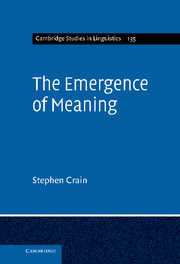Book contents
Preface
Published online by Cambridge University Press: 05 November 2012
Summary
Preface
This book is an introduction to logic and language. It reports the findings of experimental investigations of how logical expressions are acquired by English-speaking children and by Mandarin-speaking children. By comparing different languages, and by examining how logical expressions enter children’s language, we hope to shed some light on one of the key questions in linguistics, philosophy, and in cognitive science: are human languages logical?
For at least forty years, it has been widely accepted that human beings are not logical, and that the culprit is the languages we speak. Researchers in the psychology of reasoning have concluded that the meanings of logical expressions in human languages are not the same as the meanings of the corresponding expressions in classical logic. Evidence cited in support of this conclusion includes assessments of people’s understanding of basic logical concepts, such as the expressions in human languages which correspond to disjunction in classical logic. In English the word for disjunction is or. In one series of experiments, English speakers were asked to respond to instructions such as Give me the red balloon or the blue balloon. In responding, subjects never gave the experimenter both the red balloon and the blue one. From a logical point of view, it would have been correct for the English-speaking subjects to have given the experimenter both balloons. Because in classical logic, a formula with disjunction, A or B, is true if both A and B are true, as well as in circumstances in which A alone, or B alone, is true. Based on the responses by subjects, reasoning experts inferred that the meaning of or in English is exclusive disjunction: A or B, but not both, rather than inclusive disjunction, A or B, and possibly both, as in classical logic. Of course this is just one finding, among many, that has led to the view that human languages and classical logic have little in common.
- Type
- Chapter
- Information
- The Emergence of Meaning , pp. xiii - xviPublisher: Cambridge University PressPrint publication year: 2012



